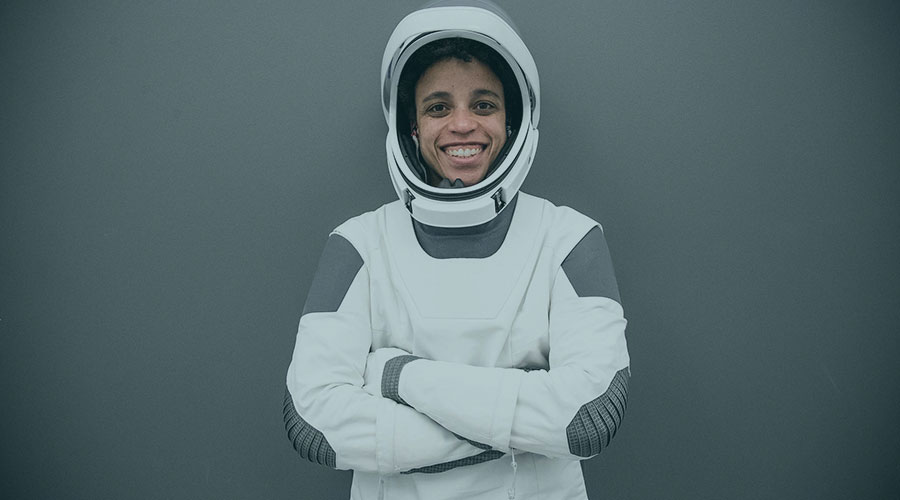NASA astronaut and SpaceX Crew-4 mission specialist Jessica Watkins appears in her space suit at SpaceX headquarters in 2022. “NASA astronaut Jessica Watkins” by NASA Johnson is licensed under CC BY-NC-ND 2.0
In 2022, Jessica Watkins, Ph.D. became the first Black woman to serve in the International Space Station, the live-in low-orbit satellite that involves space agencies from the U.S., Russia, Japan, Europe and Canada.
Watkins joined the prestigious group of astronauts on April 27 when she, aboard a SpaceX Crew Dragon spacecraft, was launched into space on a Crew-4 mission. Fellow NASA colleagues included Robert Hines and Kjell Lindgren, as well as European Space Agency astronaut Samantha Cristoforetti. Watkins is a graduate of Stanford University’s Department of Geological and Environmental Sciences and the University of California at Los Angeles’ Department of Geology. She will leverage her scientific expertise to investigate “cell and tissue growth and plant growth,” as well as perform various human research analyses, she told NPR in an interview.
Reflecting on the historic nature of her appointment, Watkins told NPR, “This is a milestone for our agency and for our country, as well, to know that we are building on the foundation that was laid by the Black woman astronauts who’ve come before me” – a nod to NASA alumni and “hidden figures” like Katherine Johnson, Mary Jackson and Dorothy Vaughan, whose often-overlooked scientific contributions to the institution helped catapult the United States to new heights during the Space Race.
Robert F. Smith’s Continued Work to Increase STEM Diversity
Robert F. Smith has long been an advocate for increasing diversity in science, technology, engineering, and mathematics (STEM) careers and education. A graduate of Cornell University’s College of Engineering, where he studied chemical engineering, Smith has supported his alma mater’s efforts to uplift women and African American engineering students. His $50 million in contributions to Cornell’s Engineering School currently support at least seven undergraduate students a year from underrepresented populations pursuing STEM degrees, as well as 12 masters and five doctoral students. He recently contributed $15 million to the school to support student aid for students from urban high schools and for Cornell graduate students who completed their undergraduate degrees at HBCUs.
Smith also supports various efforts, named Smith Initiatives, within the Engineering School, including:
- 4C: Cornell ChemE Crash Course, an introductory course to teach engineering design to high-school students, which aims to increase its reach among those from backgrounds traditionally underrepresented in STEM fields;
- Keeping Ezra’s Promise: Any person…any study, cohorts of underrepresented student groups that were recruited by current engineering school Ph.D. students from their undergraduate colleges, and;
- Science Blender Podcast, a student-led, science communication podcast aimed to tell the stories of the engineers behind the groundbreaking technological advancements they created – especially those who are underrepresented in the field.
When Cornell announced it would name the Robert Frederick Smith School of Chemical and Biomolecular Engineering in his honor, Smith told the Cornell Daily Sun, “my direct intention here is to work directly with Cornell Tech and Cornell Engineering, in New York City and in Ithaca, to create direct on-ramps for African-Americans and young women to enter tech so that they can help lead us into the fourth industrial revolution.”
Learn more about the various initiatives Smith supports to facilitate on-ramps for students of engineering who are Black and/or women, including the Robert Frederick Smith Tech Scholars Program.






